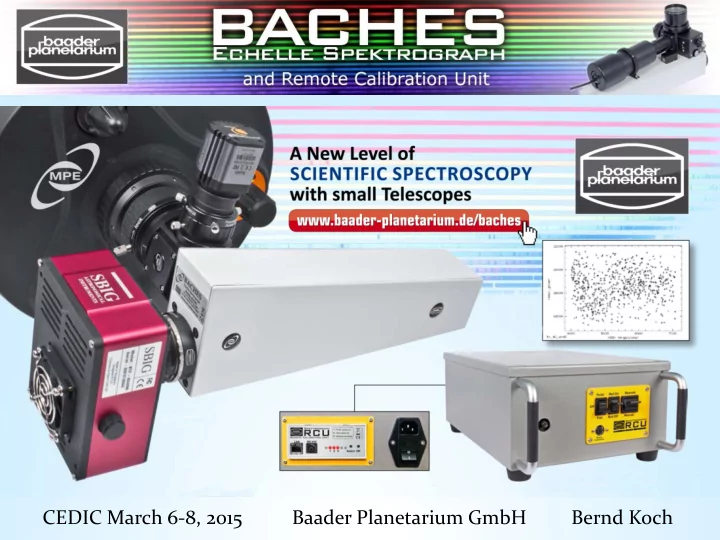

CEDIC March 6-8, 2015 Baader Planetarium GmbH Bernd Koch
The BACHES Echelle Spectrograph BACHES is the acronym for BAsic ECHElle Spectrograph „Echelle“ is a french word, which means „ladder“ Developed by ESO Scientists and Baader Planetarium GmbH CEDIC March 6-8, 2015 Baader Planetarium GmbH Bernd Koch
A conventional Blazed Grating Spectrograph Fluorescent lamp Designed for maximum efficiency in the first order Higher orders order not useable due to overlap m = -1 m = 0 m = 1 m = 2 m = 3 Additive interference occurs when the total path difference D of light from adjacent slits (S1) and (S2) is an integer multiple of the wavelength λ: The phase is then the same, so the beams’ intensity add. D = m l = D 1 – D 2 = g(sin a - sin b ) with m =0, ±1, ±2 S1 S2 g: Groove spacing, m: Order number CEDIC March 6-8, 2015 Baader Planetarium GmbH Bernd Koch
A conventional Blazed Grating Spectrograph Fluorescent lamp Designed for maximum efficiency in the first order Higher orders order not useable due to overlap First order Zero order First order Second order Third order Low resolution when a full frame spectrum High resolution only in a small wavelength range from 360 nm to 1000 nm is required due to limited size on a CCD sensor ‘‘wasted space“ on CCD sensor ‘‘wasted space“ on CCD sensor CEDIC March 6-8, 2015 Baader Planetarium GmbH Bernd Koch
The Echelle Optical Path Incoming light Mixed color Cross Disperser separating BACHES the orders ca. #33 to ca. #58 echelle grating in high order High resolution spectrum separated from about 390 nm (top) to 760 nm (bottom) Adopted from C. R. Kitchin, Optical Astronomical Spectroscopy CEDIC March 6-8, 2015 Baader Planetarium GmbH Bernd Koch
BACHES High Resolution Solar Spectrum („Daylight“) CEDIC March 6-8, 2015 Baader Planetarium GmbH Bernd Koch
BACHES Calibration Version Standard Starlight Guiding Port ThAr Lamp CEDIC March 6-8, 2015 Baader Planetarium GmbH Bernd Koch
BACHES Calibration Version Professional with Remote Calibration Unit RCU SBIG ST-1603ME Optical fiber Remote Flip-Mirror control Focusing RCU with ThAr Reference & Halogen Flatfield lamp CEDIC March 6-8, 2015 Baader Planetarium GmbH Bernd Koch
1. Glass fiber coupler 2. Power connector for motor 3. Three position switch for OFF, Th/Ar ON, or flat-field ON 4. Two position switch for coupling calibration mirror in BACHES 5. Two position switch to select remote and manual operation Rear panel Remote control by Internet Browser CEDIC March 6-8, 2015 Baader Planetarium GmbH Bernd Koch
Calibration of BACHES Echelle Spectra 1. Manual calibration by identification of spectral lines -> selected orders only Daylight spectrum -> Class G2 V Prominent spectral lines from Ca II (K) to H a CEDIC March 6-8, 2015 Baader Planetarium GmbH Bernd Koch
Calibration of BACHES Echelle Spectra 2. Manual wavelength calibration with the Thorium-Argon reference lamp Daylight spectrum -> Class G2 V The Thorium-Argon spectrum provides about 1,000 precisely known wavelengths for calibration CEDIC March 6-8, 2015 Baader Planetarium GmbH Bernd Koch
Calibration of BACHES Echelle Spectra 3. Semi- automatic calibration with the RCU‘s Thorium -Argon reference lamp and flatfield lamp with ESO-MIDAS ThAr reference spectrum Halogen Daylight spectrum -> Class G2 V flatfield spectrum CEDIC March 6-8, 2015 Baader Planetarium GmbH Bernd Koch
Calibration of BACHES Echelle Spectra 4. Result: Fully calibrated daylight spectrum from 3923Å to 7084Å (KAF-1603ME) Wavelength calibration: Mean RMS= 0.015Å Daylight spectrum, BACHES 25 m m slit CEDIC March 6-8, 2015 Baader Planetarium GmbH Bernd Koch
Calibration of BACHES Echelle Spectra 5. How to semi-automatically calibrate with ESO-MIDAS -> Video Tutorial Wavelength calibration of the emission line star zeta Tau: www.baader-planetarium.de/baches/ CEDIC March 6-8, 2015 Baader Planetarium GmbH Bernd Koch
Calibration of BACHES Echelle Spectra 6. How to semi-automatically calibrate with ESO-MIDAS -> manual & exercise files: www.baader-planetarium.de/baches/download/midas_manual_e.pdf CEDIC March 6-8, 2015 Baader Planetarium GmbH Bernd Koch
Scientific Application of BACHES Echelle Emission line stars: Simultaneous monitoring of variations in stellar flux at different wavelengths Example: Semi‐detached binary star beta Lyrae. Purpose: Tracking variations during a binary orbit silmultaneously at different wavelengths in the BACHES echelle spectrum CEDIC March 6-8, 2015 Baader Planetarium GmbH Bernd Koch
Scientific Application of BACHES Echelle www.baader-planetarium.de/baches/ CEDIC March 6-8, 2015 Baader Planetarium GmbH Bernd Koch
Scientific Application of BACHES Echelle http://www.baader-planetarium.de/baches/download/beta_lyr_baches_poster_e2_bernd_koch.pdf CEDIC March 6-8, 2015 Baader Planetarium GmbH Bernd Koch
Scientific Application of BACHES Echelle The average spectral resolution of R=18,000 and precisely coverage of the full visible spectrum from 392nm to 760nm make BACHES scientifically useful for the Analysis of stars with orbiting Exoplanets. The planet influence on the radial velocity of the parent star by approximately Jupiter‐sized exoplanets can be studied by means of spectroscopy (revealing a lower mass limit) and photometry (planet size and orbit) CEDIC March 6-8, 2015 Baader Planetarium GmbH Bernd Koch
Thank you very much for your attention BACHES Website: www.baader-planetarium.de/baches/ Contact: Bernd Koch B.Koch@Baader-Planetarium.de Bernd.Koch@astrofoto.de a Cyg (Deneb) Variable H a line due to stellar wind 2014-09-08 CEDIC March 6-8, 2015 Baader Planetarium GmbH Bernd Koch
Recommend
More recommend